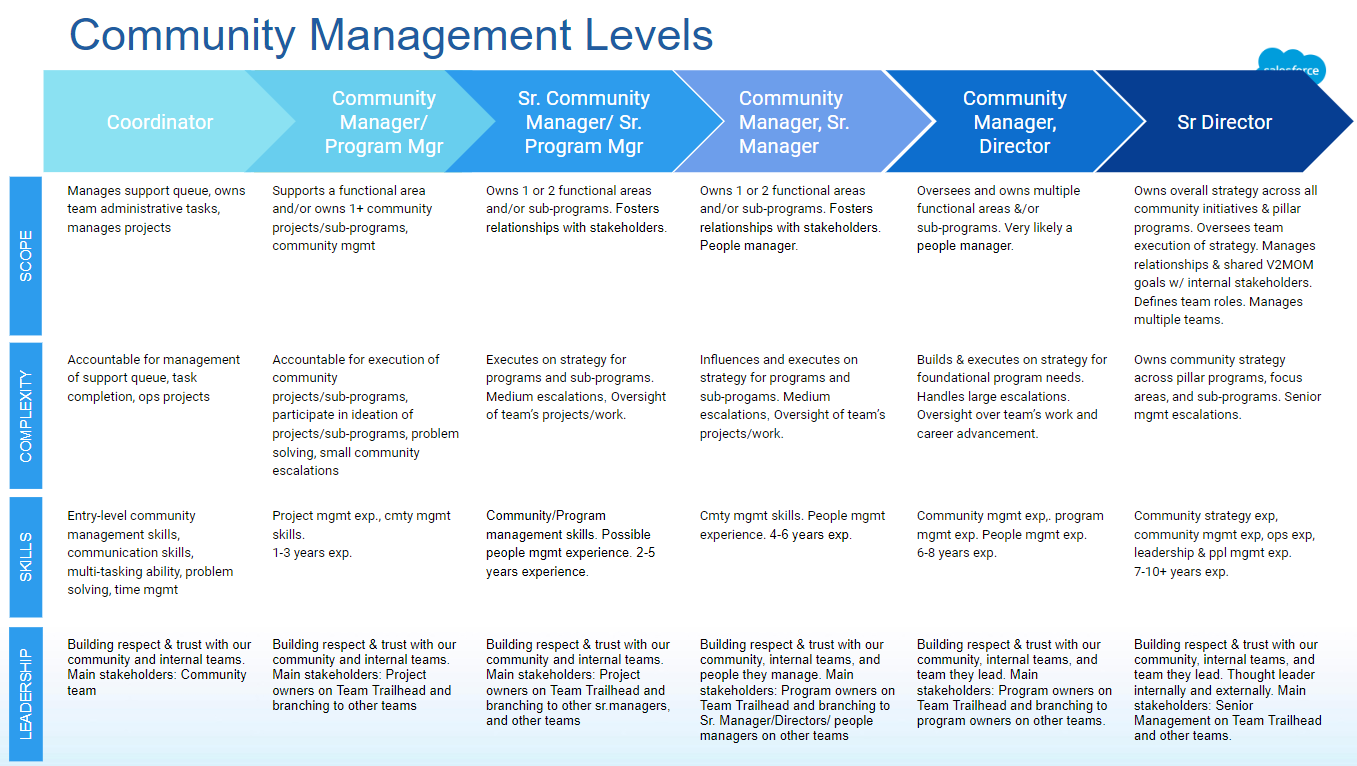Summary: There are a wide variety of career paths available in community building, and prospective group organizers should not feel that their career success is completely tied to the success of EA.
I occasionally hear that people are hesitant to start or organize EA groups because the career path seems too narrow and tied to EA: if you spend your free time learning some programming language than there are a wide variety of tech companies you could work for, but if you spend your free time organizing EA meet ups then the number of career options is more limited.
There is some truth to this, but I worry people underestimate how many career paths there are in community building, not just in EA or nonprofits more generally, but also in the for-profit world.
For example, Salesforce has a Trailblazer Community with community groups that run meet ups, community conferences, a forum, social media, etc. The people managing this are employees of Salesforce, and they have a career ladder which goes up to the senior director level:

Many tech companies have similar programs (e.g. Asana). A cursory search for “community manager jobs” turns up positions at big companies like WeWork, Yelp, NVIDIA, and Discord, as well as startups like Notion.
And of course in the nonprofit space there are many community organizing opportunities, a career path that sometimes culminates in becoming leader of the free world.
Building Intellectual Progress
An important task for EA community builders is sharing important ideas and creating engaged discussion about them. This is somewhat different than what, say, a WeWork community manager does, but does have analogues in the for-profit world.
Technology Evangelists are one example. Apple’s success is sometimes credited to their “software evangelists”, who were responsible for explaining the principles behind the Macintosh operating system to third-party developers and encouraging them to write software for the platform. Many technology micro celebrities have worked as paid evangelists: Robert Scoble (Microsoft), Guy Kawasaki (Apple), Vint Cerf (Google). A cursory search finds current openings at Facebook, Twilio, Apple, and most other major tech companies.
These positions often involve things like “travel to different meet ups and talk about some database theory principle which just so happens to argue in favor of using your employer’s database product”. Of course, this is fundamentally about promoting some product, as opposed to the (hopefully) objective discussion nurtured at EA groups, but skills like “create engaged discussion at meet ups” and “clearly explain complex topics” are transferable.
Other Similar Careers
Group organizers also play roles similar to science communicators (e.g. this job) and headhunters (e.g. this) but I am less familiar with those career paths so I’m not including them here. I would love if others who are more familiar with them could comment or make their own posts regarding the feasibility of transferring from being a group organizer to one of these careers.
Next Steps
If you are interested in understanding what jobs are available in this space outside of EA, the major community management industry organization is having a career fair at the end of this month. You could also join community management slack groups like this one or listen to podcasts like this one. David Nash has also written a list of community building career paths you might find interesting.
Note: this is a personal post. My views are not any of my employers'. Thanks to Manuel Allgaier for the link to David's list of career paths.

Contrary to what seems an implicit premise of this post, my impression is
- most EA group organizers should have this as a side-project, and should not think about "community building" as about their "career path" where they could possibly continue to do it in a company like Salesforce
- the label "community building" is unfortunate for what most of the EA group organizing work should consist of
- most of the tasks in "EA community building" involve skills which are pretty universal a generally useable in most other fields, like "strategizing", "understanding people", "networking" or "running events"
- for example: in my view, what can an EA group organizer on a research career path get from organizing an EA group as a side-project are skills like "organizing event", "explaining complex ideas to people" or even "thinking clearly in groups about important topics". Often the benfits of improving/practicing such skills for a research career are similar or larger than e.g. learning a new programming language
There are exceptions to this, such as people who want to work on large groups full time, build national groups, or similar. In my view these projects are often roughly of the scope of founding or leading a startup or a NGO and should be attempted by people who, in general, have a lot of optionality in what to do both before working on an EA group and eventually after it.
Vint Cerf seems actually more of a counterexample toward "community building and evangelism" as a career objective: anyone who wants to follow this path should note he wrote the TCP protocol internet is still running on first, co-founded one of the entities governing internet later, and worked for Google on community building only after all these experiences.
Another reason I'm sceptical of the value of this argument is my guess is people who would be convinced by it ("previously I was hesitant about organizing an EA group because the career path seems too narrow and tied to EA, now I see career paths in for-profit world") are people who should mostly not lead or start EA groups. In most cases EA group organizing involves significant amount of talking to people about careers, and whoever has so limited understanding of the careers to benefit from this advice seems likely to have non-trivial chance of giving people harmful career advice.